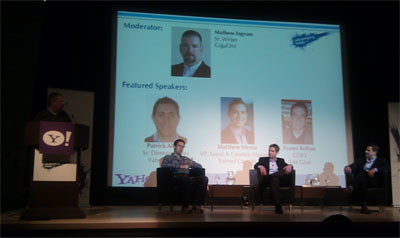Who owns the Internet? Advertising Week kicks-off with a look at the rules of social engagement online
 The Advertising Week speaker series kicked-off in Toronto yesterday with a panel discussion on the topic of why All Media is Social sponsored by Yahoo! Canada. Matthew Ingram, Sr. Writer at GigaOM, was the moderator for the panel which covered topics related to integrating social media into your marketing mix and understanding how social media is impacting all media online and offline.
The Advertising Week speaker series kicked-off in Toronto yesterday with a panel discussion on the topic of why All Media is Social sponsored by Yahoo! Canada. Matthew Ingram, Sr. Writer at GigaOM, was the moderator for the panel which covered topics related to integrating social media into your marketing mix and understanding how social media is impacting all media online and offline.
Matthew Idema, VP Local and Country Manager at Yahoo! Canada, kicked-off the discussion with an explanation of their latest social media offering – the Yahoo! Contributor Network which is arguably the world’s largest crowd-sourced content network. Idema explained that Yahoo! is now able to tap into 500,000 online contributors who provide content on niche topics. This helps Yahoo! to provide deeper coverage of local market interests.
While local content was a pervasive topic of discussion throughout the event, there were several ideas that really stood out as emerging trends in social media which I thought I’d share below.
The ideal reward for check-ins is still an untapped business model. Fraser Kelton, COO of GetGlue – an entertainment based social network that offers partner rewards in exchange for check-ins while consuming content, explained how his company is looking for better ways to reward users beyond the idea of just becoming a superfan. GetGlue currently has over 800,000 users and 10M new unique user ratings and check-ins for entertainment media every month. Their current business model focuses on developing co-promotion deals with media and entertainment companies to get fans to check-in whenever they are consuming content – like watching their favourite TV show such as Glee.
As a current reward for being a superfan of a show like Glee, GetGlue sends users items like stickers to put on their iPhone or laptop to identify that they are a “super Gleek.” Kelton explained that this type of reward speaks to the users’ social and personal value. Beyond just having the bragging rights for being a fan online, users are able to share a symbol of their reward with everyone and anyone who comes into contact with them offline.
Kelton said that his company is trying to take super fandom a step further by looking for advertisers to offer rewards like a discount or free burger when the user becomes a superfan. However, the entire panel agreed that the ideal method for rewarding check-ins is a business model that is still untapped. Patrick Albano, Sr. Director of Sales at Yahoo!, said that perhaps we will see an evolution in this model that will look more like frequent flyer reward points in the future.
 “Likes” are the new content subscription model. Fraser Kelton proposed a very interesting theory that Facebook “likes” have helped to identify a new way for consumers to subscribe to media and advertiser content through social media. Keltonexplained that once you like a particular brand on Facebook, you are then automatically opted-in to receive news feeds from that brand which will ultimately drive you to either their fan page or their website – whatever works best for your marketing objective.
“Likes” are the new content subscription model. Fraser Kelton proposed a very interesting theory that Facebook “likes” have helped to identify a new way for consumers to subscribe to media and advertiser content through social media. Keltonexplained that once you like a particular brand on Facebook, you are then automatically opted-in to receive news feeds from that brand which will ultimately drive you to either their fan page or their website – whatever works best for your marketing objective.
Matthew Ingram asked the panel speakers whether they agreed with the idea that brands should forgo having their own website and take the risk of just existing online via a page on Facebook. The panel argued that brands currently need to be on Facebook, regardless of whether they have another presence on the web. However, it is ultimately up to the advertiser to decide whether they want to engage with the user within the Facebook interface or take them to a more branded experience on their own website. The key is to determine which social media tools will help you to initiate the conversation and make sure that the tool fits with your marketing objectives.
Group buying sites should reward loyalty with check-ins. Matthew Ingram asked the panel speakers why we have yet to see sites like Groupon integrating loyalty rewards with check-in tools. Matthew Idema from Yahoo! assured the audience that this is a trend that we will definitely see emerging this year as local advertisers start to blend the two experiences together.
Consumers own and regulate the Internet. There was a question raised from the audience in regards to “who owns the Internet?” Although Patrick Albano from Yahoo! tried to make a strong argument that Facebook currently owns the Internet, the rest of the panellists argued that is ultimately users who will continue to regulate social interaction and the rules of engagement online. Users will simply just stop interacting with content that they dislike and thus continue to manage the rules of social media etiquette in the future.




